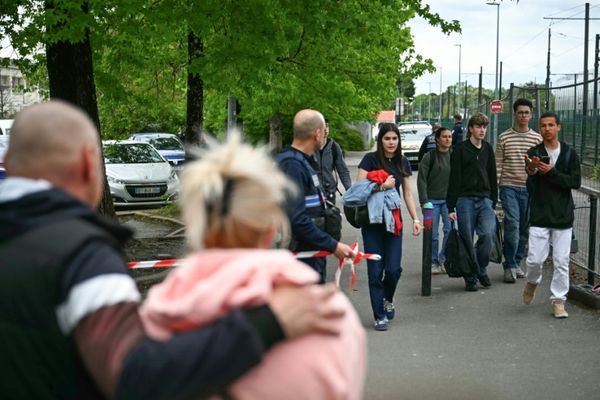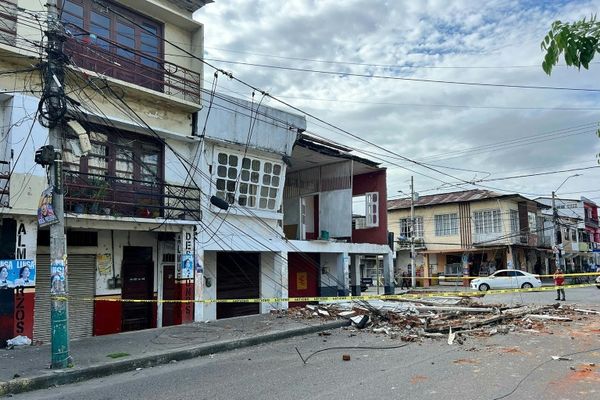
Pressure has intensified on Israel to negotiate the release of more than 200 people held by Palestinian militants in Gaza, with desperate families begging officials to help free their loved ones before an anticipated ground invasion.
An Israeli military spokesperson announced on Sunday that more than 212 people were held in Gaza, as officials worked to identify and locate those missing after a deadly incursion by Hamas on 7 October.
On Sunday evening, a group of families of those held hostage in Gaza met the Israeli president, Isaac Herzog, at his residence in Jerusalem for almost two hours, as crowds gathered outside, singing songs of mourning.

“Don’t forget us,” one woman called to the crowd – a sea of yellow ribbons, Israeli flags and signs reading “bring them home”.
“The message from the president is that the whole leadership came together to resolve this crisis,” said Eyal Eshel, the father of 19-year-old Roni Eshel, who was serving at a military base near the border with Gaza. “I want to tell the only person that can resolve this, prime minister [Benjamin] Netanyahu: you recruited our girls, our request is you bring them home – all of them.”

The pressure comes from inside and outside Israel. Many of the hostages were citizens or dual nationals of countries around the world, including Israel’s closest allies. At least some of the 10 US citizens still unaccounted for after the 7 October attack are believed to being held in Gaza. There are also 17 Thais among the hostages, and eight Germans. Seven British nationals and seven French citizens are still classified as missing, and some of them are believed to be hostages too.
So far, two US citizens, Judith Raanan and her daughter Natalie, whom Hamas have been released after mediation by Qatari officials. Members of the International Committee of the Red Cross escorted the pair out of Gaza late on Friday night, before both joined hands with Gal Hirsch, Israel’s recently appointed focal point for hostages and missing people. The pair were then accompanied to an Israeli military base where they were reunited with their families.
The US secretary of state, Antony Blinken, said he had spoken to the two freed hostages and described them as “strong of mind, strong of spirit”.
But he told NBC News: “There remain many others, and we’re hopeful that more are released, but the bottom line is this: They need to be released, each and every one of them, now, unconditionally.”
CNN reported on Sunday that the Biden administration had pressed Israel to delay the ground assault on Gaza to allow time for the release of more hostages and the delivery of more aid to the besieged enclave.
On Friday Joe Biden appeared to tell reporters himself that the invasion should be delayed for the sake of freeing hostages, but the White House later said the US president had misheard the question he was being asked and was simply stating he wanted to see the release of more of the people being held inside Gaza.
Pressure on Israeli officials increased after an announcement by Abu Obeida, a spokesperson from Hamas’s military wing, the Al Qassam brigades, who said the next day that the group had also offered to free two Israeli citizens, “for humanitarian reasons and without expecting anything in return. However, the Israeli occupation government refused to accept them”.
The office of the Israeli prime minister, Benjamin Netanyahu, denied Hamas’s claim of an offer to release more hostages, describing it as “mendacious propaganda”, adding: “We will continue to do everything necessary to bring all the captives and missing back home.”
Families of those held in Gaza fear that time is running out to free their loved ones before an expected ground invasion of the territory, amid fears that once the operation begins, freeing further hostages will be an impossibility. Many relatives of those held in Gaza remain at a sit-in outside the Israeli military headquarters in Tel Aviv, holding signs begging officials to negotiate.
“Refusing to engage in negotiations … destroys any remaining confidence that remained after the 7 October,” said Ruth Halperin-Kaddari, who gathered with tens of others outside the Israeli president’s residence. “It’s a complete breach of the contract between the people and the state.”
Halperin-Kaddari, an Israeli legal scholar and international women’s rights advocate, called the appointment of Hirsch to oversee the hostage crisis “disturbing”.
“It seems they didn’t pick the best-qualified person for the job, instead criteria was allegiance to the prime minister and his family,” she said, pointing to how Hirsch handled the Raanans’ release.
“He put himself to the front of the frame [during their release] and grasped their hands, women who had just gotten released from hell. It shows what he cares about is his ego.”
There are still many missing people from the Israeli communities around Gaza, although not all are presumed to be hostages because it has taken time to identify the bodies. The family of the missing British teenager Noiya Sharabi said on Sunday that she had been murdered in the Hamas attack. Her 13-year-old sister, Yahel, and mother, Lianne, had already been declared dead. The girls’ father, Eli, is still missing.

At least 1,400 people were killed in Hamas’s attack on Israel, prompting Israeli officials to pledge the complete dismantling of Hamas’s control inside the Gaza Strip. A fierce Israeli bombardment campaign has so far killed more than 4,600 people and wounded 14,245.
Officials including Netanyahu have demanded the unconditional release of all hostages held in Gaza as Israel continues its bombardment. Hamas said they seized the captives in order to enact an exchange for some of the thousands of Palestinians detained in Israel.
Daniel Levy, a former Israeli peace negotiator, said the release of the Raanans had allowed a glimmer of hope for the families of other hostages that their cases might be possible, upping the pressure on Israeli officials to act.
“I think the release created some new dynamics. It’s given a little opening for these families to speak out more, to assert themselves,” he said. How long they have to wait before getting another gesture, another release, to keep that dynamic going, we don’t know.”
Levy said Natalie and Judith Raanan were likely to have been selected for release because of their nationality, but potentially also because of the location where they were held. “I tend to think it was also about ease of movement … about who is accessible and held in a way that they were not exposed to too much when debriefed,” he said.
He also pointed to the role played by Qatari officials, who said they were continuing to negotiate in the hope of freeing more hostages. “I think it’s also demonstrated the usefulness of having the channels and of having state actors who can activate those channels,” he said.
A spokesperson for the Qatari foreign ministry, Majid Al-Ansari, said: “We hope these efforts will lead to the release of all civilian hostages from every nationality, with the ultimate aim of de-escalating the current crisis and restoring peace.”
Hamas said last week that at least 22 of the hostages in their custody had been killed by Israeli bombardments. The group includes dual nationals from the US, Germany, the Netherlands and Mexico, amid increasing pressure from foreign governments to see their nationals walk free before Israel further escalates its assault on Gaza.
“I’m begging the world to bring my baby back home,” Keren Sharf Shem, the mother of 21-year-old Mia Shem, told a press conference last week. “She only went to a party, to a festival, to have some fun,” she said tearfully, clutching a picture of her daughter who was kidnapped from the Supernova music festival on the Gaza border.
Hamas released a video of Shem, a French-Israeli citizen, including footage of a gloved figure in a white coat bandaging her wounded arm, with explosions audible in the background as the young woman addressed the camera.
“They took care of me, treated me and gave me medicine,” she said in the video. Her mother later described her daughter’s expression as terrified.
Others, including some families of hostages who met Netanyahu a week after Hamas’s incursion, have said publicly that they see an attack on Gaza to prevent the group’s continued control of the strip as the only potential way forward. The Israeli military called up more than 360,000 reservists and has deployed what its spokespeople described as “an iron wall” of heavy machinery around the Gaza Strip, declaring its readiness for a ground invasion at a time of the government’s choosing.
“In a time of war the people of Israel have to make sacrifices, even when our children are there, and prevail,” Tzvika Mor, the father of Eitan, who is among the missing, told Israeli radio after meeting the Israeli prime minister earlier this month.
Avi Melamed, a former Israeli intelligence official said the country’s policy had been to try to separate the issue of the hostages from a potential ground invasion, despite increasing pressure from other countries whose citizens are held in Gaza. “I think that Israel will address the issue of hostages as if there is no war, and move ahead with war plan as if there are no hostages,” he said.







